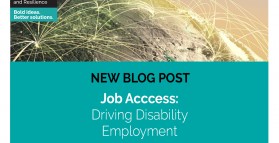BLOG: Job Access: Driving Disability Employment

This week’s Hopkins Centre Dignity project blog explores the Government initiative Job Access – ‘the national hub for workplace and employment information for people with disability, employers and service providers.’
Broken into three parts, we are joined this week (Part C) by Dr Scott Hollier – Chief Executive Officer & Co-founder at Centre for Accessibility along with Lindsay Nott, founder of MyC5Life.
Lindsay Nott
“Independence is happiness! I love technology and being gainfully employed and am open to hearing about ways different advancements can be used to my benefit and to make my job easier and more accessible. Technology is moving at a fast pace, and there are technologies available now, that were not around when I sustained my injury, which have helped me to become increasingly independent in the workplace”.
“My employer has been very supportive, and I work in an environment which is inclusive and accessible. I had the assistance from an Occupational Therapist (OT) and Job Access upon commencement of the role and was provided with suitable accessible and adaptive technologies that aid my work processes”.
“My overall experience was smooth and successful, due to the valuable assistance from my OT, who was familiar with the process, protocols and supporting documents required”.
Scott Hollier
“Getting a foot in the door when it comes to employment is one of the hardest things I’ve tried to do as a legally blind person, but I’d like to encourage others that it can work out in the end”.
“My first job interview was for an entry-level IT position at a state government department – and it seemed to go well, so I was surprised when I didn’t get the job… I was told that the other person had more experience, which at the time surprised me as there was no particular experience required for that position”.
“My second interview was similar to the first, except that I noticed a definite point at which the atmosphere in the interview changed – right when I mentioned my eyesight. Once I’d explained … a frost descended on the room. The rejection letter turned up in the mail sometime later.”
“After six months of the same pattern of making the interview process, but missing out on the position…I sent a letter to every Internet Service Provider (ISP) in Western Australia, about 50 in all. After a week … I was employed by an internet provider”.
“I have not used the Job Access Network (JAN) very often in my career and do not use it presently. My first experience of JAN was when I worked in Sydney for two years and was provided assistance by way of a desktop screen magnifier. This assistive technology cost many thousands of dollars, and Job Access helped support it. It’s good that the service is there, but the process was very complicated, and I suspect the cost of the products had been inflated, and were even more expensive than they should have been, because the supplier knew Job Access would pay for it”.
Now as a CEO of a not-for-profit myself, I often reflect back in time, especially as the unemployment rate for people with disability has barely changed since the 1990s when I went looking for my first job. Encouragingly though, attitudes are changing – there’s more opportunities than ever before to make work accessible, and the pursuit of education can make so many employment dreams come true – eventually! It’s been my observation that most of the barriers to employment are brought into the room before the person with disability even gets there, so I’d encourage potential employers and potential employees to consider what those barriers are, so that capable and dedicated people with disability can get to work with the dignity they deserve”.
To find our more, join The Dignity Project Community Hub and continue the discussion: http://www.hopkinscentre.edu.au/the-dignity-project
Have an experience you would like to share? Join The Dignity Project Team at our upcoming “Focus Groups” and help uncover the meaning of dignity for people with disability. Our focus groups will be held virtually via Microsoft Teams on 18 and 23 June? To find out more Email: dignityproject@griffith.edu.au
Tags: Job Access, Dignity, Dignity Project, People With Disability, Employment, Lindsay Nott, Scott Hollier
Related Articles
- Celebrating International Day for People with disability
- The Importance of Dignity and The Dignity Project
- COVID 19 Impact and Future
- Media Release - Launch of The Dignity Project Citizen Science Initiative
- Preserving our dignity

